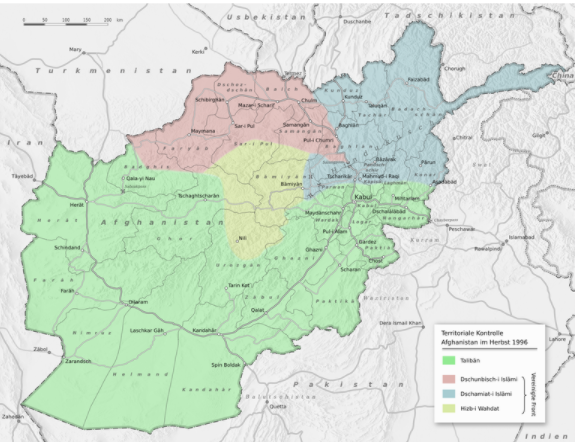Taliban Keeps Afghan Girls Above Sixth Grade Level From Returning To School

This is a map of the control the Taliban gained after the capture of the capital, Kabul. The green is Taliban control, red is Junbish-i Islami, blue is Jamiat-i Islami, and yellow is Hizb-i Vahdat.
March 30, 2022
According to Webster’s dictionary, the Taliban is a fundamentalist Islamic militia in Afghanistan. The Taliban dictates what women should wear, what cell phones they should have, how they travel, and how the workplace is separated by gender. Previously, the Taliban shut down schools, but decided later that schools would reopen. The students would be allowed to go back to school after the Afghan new year, under the condition that boys and girls attend different schools or learn at different hours. Despite this declaration, just hours before their return, Afghan girls were denied entry and their right to education once again for 187 days. The Taliban said that the Afghan girls may not return to school until a school uniform that is fitting to Sharia and Afghan customs and culture can be created. Due to this recent ban, Afghan girls were left feeling betrayed.
Teenage Afghan girl Adeeba, who temporarily went to Al Fatah Girls School in the capital, Kabul, states, “Not only me but everyone you asked believed that the Taliban had changed.” Then, Adeeba’s 11-year-old sister, Malahat states, “When they sent everyone back home from school, we understood that the Taliban were the same Taliban of 25 years ago.”Adeeba and her sister Malahat said they genuinely felt there was a change in the Taliban and looked forward to a promising future within their education. The sisters, along with the majority of teenagers in Afghanistan, were let down with the Taliban inability to fulfill the promise that their return to power would be accompanied by a gentler rule. This gentler rule is compared to their rule from 1996 to 2001, which was known for abusing human rights. Along with Afghanistan teens’ emotions, people from the U.S hear about this and feel disappointed and saddened by this event.
As a young teen herself, sophomore Daphne Knight speaks about her opinion on the matter. “I think it is unfair, as girls of any age should be able to have an access to education.” In addition to Daphne thinking the situation is unethical, the chief of mission for the US Embassy in Kabul, Ian McCary says he felt “deeply troubled” due to reports of Afghan girls being kept from going back to school. Then, on a Twitter post he states the news was “very disappointing & contradicts many Taliban assurances & statements. All Afghan youth deserve to be educated.”
Returning to school was an important milestone for everyone in Afghanistan, and it has left young girls betrayed, people from the outside sad, and an official disappointed. This event is still ongoing, and new information arises by the day.











